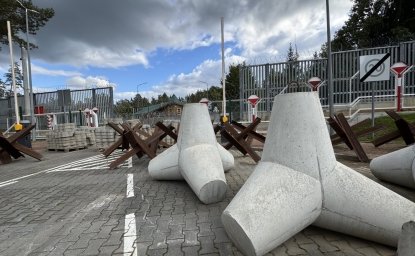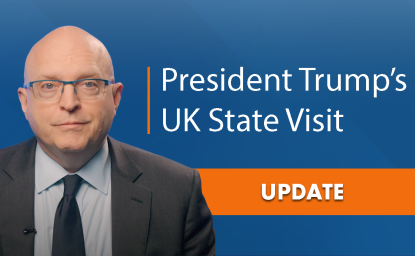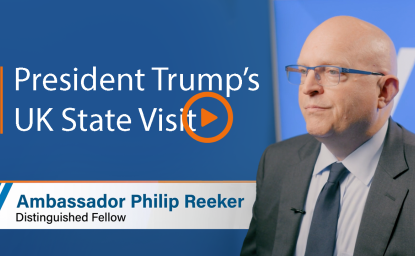by Peter Bean
As spectacular as the images of the hundreds of thousands of Ukrainian protestors were to see on television, hearing William Green Miller describe his six weeks in Ukraine and how the events surrounding the disputed presidential elections unfolded felt like being right there among the Maydan Parliament, as the great assembly in Independence Square came to be known. On January 6th, Miller, the former Ambassador to Ukraine and a Senior Scholar at the Wilson Center, captured the minds and imaginations of his audience at a Woodrow Wilson Center Director's Forum, providing an insider's perspective on the historic Ukrainian presidential election and the people who took part in it.
On November 21 of 2004, millions of Ukrainians cast their ballots in a presidential election that pitted Prime Minister Viktor Yanukovich, the candidate of the entrenched Party of Power, against the opposition candidate, Viktor Yushchenko. After the government announced that Yanukovich had won the election, the thousands of election observers on hand agreed that widespread fraud marred the results and some ten thousand supporters of Yushchenko gathered in the central square in Kyiv, known as the Maydan, to protest. Within days, the number of protestors had swelled to over a million.
Time for Change
Miller said that by the parliamentary elections of 2002, it was clear to him and other experts that the people of Ukraine, by a wide majority, strongly disapproved of the ruling party and wanted change. One senior security official told Miller that over 75 percent of the electorate supported new leaders like Yushchenko or were at the least opposed to the existing leadership. But even though a majority of the electorate supported Yushchenko, Miller said his election was extremely difficult because "the clans and oligarchs [then] in power would do everything possible to keep him from being president."
In 2002, the Nash Ukraina coalition (of which Yushchenko was the leader) first challenged the established leadership in the Rada (the Ukrainian Parliament) and nearly succeeded. But mistakes made by Yushchenko and others in the coalition allowed the ruling party, supporters of Yanukovich, to remain in power.
Miller said the 2002 battle for power in the Rada set the stage for the presidential election two years later. "There would be a bitter, almost life and death battle between those factions controlled by the clans and oligarchs that were the backbone of the party of power and Nash Ukraina. The oligarchs and clan leaders were people who had been put into power by President [Leonid] Kuchma [and] who had every reason to fear that the growing popular movement that supported Viktor Yushchenko and Nash Ukraina would sweep them away from position and influence."
During the two years between the elections, the ruling party did everything possible to derail Nash Ukraina and Yushchenko. According to Miller, they terrorized his supporters, disrupted his funding, and used the state-controlled media to attack him. "He was characterized as a dilettante, more interested in painting and raising bees than doing the hard work of running a nation. They said he would be too soft—-not tough enough to run Ukraine," Miller said.
Yushchenko even survived several assassination attempts, including a near fatal poisoning, but the harder his opponents tried to break him, the stronger he seemed to become. "Under adversity, he proved his durability," Miller said. "When he started his campaign, he often sounded like an economics professor lecturing to a graduate school seminar, but from daily necessity to communicate, his speaking style grew more passionate, tighter in structure, and more persuasive."
Even the poisoning, which nearly took his life and left his face horribly disfigured, rallied his supporters. More than ever, many Ukrainians saw him as a man of the people, willing to fight for, even die for, change.
"Certainly," Miller explained, "on the Maydan, when Yushchenko spoke, those who looked at him saw a man harmed by a corrupt regime that they hated. They showed that they were in total sympathy with his struggle and believed that he had proved he was fighting for them, even at the risk of his life. The poisoning served to deepen the support of Yushchenko by the people."
An Orange Revolution
After widespread election irregularities marred the first two rounds of voting in the presidential election, tens of thousands of Yanukovich's supporters spontaneously gathered in the Maydan to protest the vote. Miller had rented an apartment just a few yards from the Maydan and was able to see the extraordinary events unfold first hand.
"The miracle of the Orange Revolution is how the parliament of the Maydan came together so suddenly, so coherently, and so effectively," Miller explained. "Most importantly, as the Orange Revolution coalesced, and became an evolving organism that grew in size and complexity day by day, protest was quickly transformed into a legitimate national expression of popular will."
Miller said that the extraordinary gathering could not have taken place if certain key conditions had not existed. First, the Mayor of Kyiv, Oleksander Omelchenko and the city council allowed people to gather in the Maydan and to erect what became a "tent city," where people could find shelter from the cold. Second, President Kuchma rejected requests for the use of force to clear the Maydan of the demonstrations and limit Yushchenko's activities. Third, the Speaker of the Rada allowed the Rada to be convened to discuss and vote on the fraudulent elections, and brokered a consensus agreement on election and constitutional reform that was crucial to holding the winning coalition together.
While all these factors were existentially important for the Orange Revolution, Miller said the most amazing aspect of the Maydan Parliament was that it was a spontaneous phenomenon of and by the people of Ukraine. "Nothing like the Maydan million was ever imagined. The impetus came from the people themselves."
Turning a million protestors into a political force is a tremendous challenge, Miller said, but Yushchenko and his team proved to be up to the task. "Putting together a legitimate, peaceful, popular revolutionary mass into a well-organized political force was a triumph of intellect, determination, courage, and not least, restraint."
Miller said the sea of orange was a spectacular, symbolic sight that dominated Kyiv's landscape. Yushchenko's supporters donned orange scarves, ties, ribbons, jackets, gloves, lipstick, and even hair. Car antennas carried orange ribbons, government buildings were decorated with orange banners, and orange ribbons brightened the branches of every tree.
"The people dressed in orange were saying emphatically and clearly that they wanted a different Ukraine-—a Ukraine of a decidedly different color-—led by different leaders," Miller said. "They wanted to get rid of the thieves who had stolen their patrimony and tarnished their integrity."
A Legitimate Revolution
Shortly after becoming an independent state in 1991, Ukraine adopted a democratic constitution. Miller noted that the Maydan phenomenon raises fundamental questions about popular expression in democratic institutions. Can a revolution against those in institutions that are democratic in form and intent be legitimate? Where is the line drawn between mob rule and legitimate direct popular action?
Miller said that, "in the minds of many Ukrainians, those on the Maydan share Yulia Tymoshenko's argument that the Maydan was where true democratic legitimacy lay, a view that was proven, in their minds, by the successful corrective actions taken by the Rada, the Supreme Court decision of December 3, and the election results of the December 26 runoff."
Miller also said that Yushchenko and his supporters want the Maydan to be both a symbolic and institutional part of the new Ukrainian political landscape. Miller said that Yushchenko took a "first important public step" when he joined the Maydan on New Year's Eve. "It was the first time they had seen a President of Ukraine standing with ordinary people in the heart of the nation, looking at them eye to eye and standing with them shoulder to shoulder."
"The next time," Miller continued, "will be at Yushchenko's inauguration when he will take the oath in the presence of the people and they will look at each other eye to eye and stand shoulder to shoulder."



